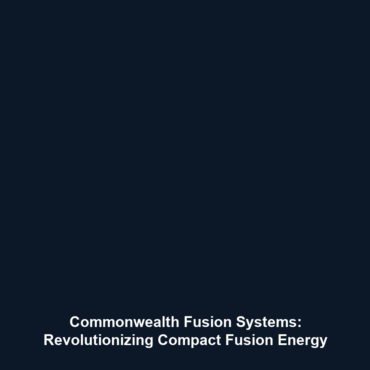<>
Commonwealth Fusion Systems (CFS): Advancing Fusion Energy
Commonwealth Fusion Systems (CFS), a revolutionary spin-off from MIT, is at the forefront of the quest for practical fusion energy. By leveraging advanced superconducting magnets for enhanced plasma confinement, CFS aims to develop a compact fusion reactor that could redefine energy generation. The significance of CFS lies not only in its innovative approach but also in its potential to transform the future of fusion energy, providing a cleaner and virtually limitless source of power.
Key Concepts of Commonwealth Fusion Systems
Understanding the innovations brought forth by CFS requires familiarity with several key concepts central to its mission:
Superconducting Magnets
CFS employs advanced superconducting magnets that allow for stronger magnetic fields with less energy loss. This technology is pivotal for stable plasma confinement—a crucial requirement for effective fusion reactions.
Plasma Confinement
Effective plasma confinement ensures that the high-temperatures required for fusion are maintained. CFS’s compact design minimizes energy input while maximizing output potential—a fundamental principle of fusion energy.
Compact Fusion Reactors
The development of compact fusion reactors is a significant leap towards implementing fusion power on a commercial scale. By reducing the size of reactors, CFS aims to make fusion energy more accessible and economically viable.
Applications and Real-World Uses
Commonwealth Fusion Systems (CFS) has the potential to impact numerous sectors:
- Power Generation: The primary application of CFS technology will be in generating electricity through fusion, promising a sustainable alternative to fossil fuels.
- Space Exploration: Efficient energy sources from CFS can support long-duration missions, providing sufficient power for spacecraft.
- Medical Technologies: Fusion reactors can potentially be harnessed to power advanced medical equipment, contributing to better healthcare solutions.
Current Challenges
While CFS is making significant advances, several challenges remain:
- Technological Barriers: Developing stable plasma at necessary temperatures is technically complex.
- Cost and Funding: The initial investment for fusion research and reactor construction is substantial.
- Regulatory Hurdles: Adapting to regulatory frameworks for new fusion technologies can delay progress.
Future Research and Innovations
The path ahead for Commonwealth Fusion Systems (CFS) is filled with exciting prospects:
- Next-Generation Technologies: Ongoing research into novel superconducting materials may enhance magnet performance.
- Pilot Plants: Plans for pilot fusion plants could transition the technology from theory to reality in practical applications.
- Collaborative Research: Partnerships with other research institutions and industry players are expected to accelerate advancements.
Conclusion
Commonwealth Fusion Systems (CFS) is poised to make significant contributions to the field of fusion energy, thanks to its innovative use of superconducting magnets for plasma confinement. As CFS continues to tackle the challenges of developing compact fusion reactors, the potential for clean, sustainable energy becomes increasingly achievable. For those interested in learning more about the future of energy generation, consider exploring our articles on fusion technology advancements and sustainable energy solutions.
